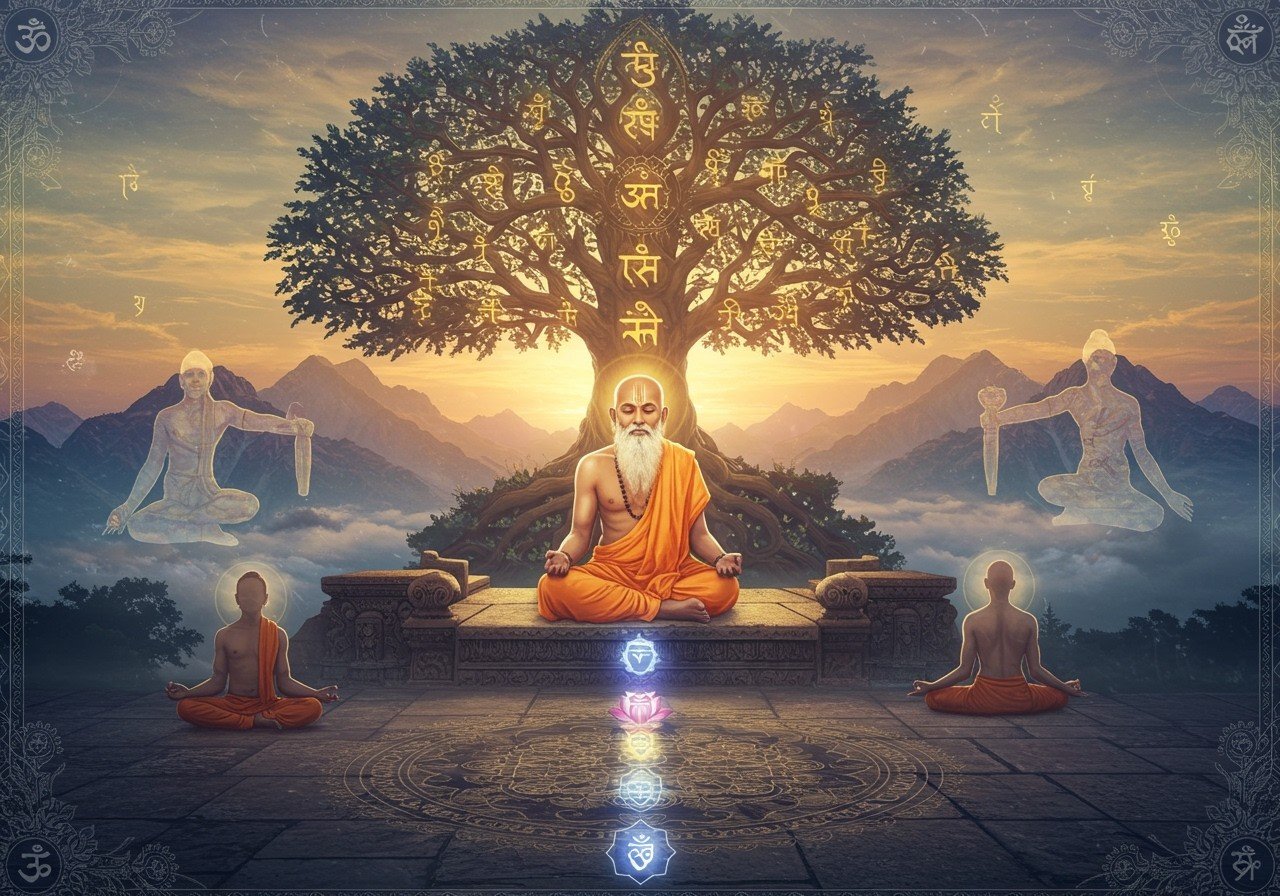
Vyasa Yoga, a profound tradition rooted in ancient wisdom, offers a transformative journey towards spiritual growth and self-discovery. This comprehensive guide explores the core teachings, prominent centers, lineage, and future of Vyasa Yoga, catering specifically to individuals who value traditional practices and seek authentic learning experiences. This exploration helps individuals understand how to achieve holistic health and mindfulness through a deep understanding of this school of yoga practice.
Understanding Vyasa Yoga
Discover the foundations of Vyasa Yoga
Vyasa Yoga derives its philosophical framework from the Vyasa Yoga Sutras, compiled by the revered sage Vyasa, who also played a crucial role in compiling the Vedas. This tradition emphasizes a holistic approach, integrating mind, body, and spirit. Meditation and mindfulness are central to Vyasa Yoga, particularly through the practice of Dhyana, which cultivates mental clarity and inner peace. Pranayama, the art of breath control, is another key component, offering benefits for physical health and emotional balance.
Furthermore, the concept of Ashtanga, the eight limbs of yoga, as outlined in Vyasa Yoga, provides a structured path for practitioners to achieve spiritual growth.
Prominent Vyasa Yoga Centers in India
Explore leading centers for authentic teachings.
India is home to numerous Vyasa Yoga centers renowned for their comprehensive teacher training programs and authentic teachings. Vyasa Yoga Bangalore, for instance, stands out for its diverse offerings, including workshops, retreats, and specialized classes. These centers play a vital role in preserving and promoting the rich heritage of Vyasa Yoga. They provide accessibility through online options for those who prefer virtual learning experiences, making the teachings available to a wider audience.
Testimonials from practitioners further highlight the transformative power of Vyasa Yoga, showcasing personal growth and positive life changes. These centers effectively blend traditional and modern teaching methods to cater to diverse learning preferences.
Vyasa Yoga Teacher Training: A Transformative Journey
Empower yourself with the skills to guide others.
Vyasa Yoga teacher training programs equip aspiring teachers with the necessary skills and knowledge to share the practice with others. These programs delve into various aspects of yoga, including anatomy, philosophy, and teaching methodology, providing a comprehensive understanding of the subject.
Emphasis on experiential learning and practical teaching experience ensures that graduates are well-prepared to lead classes effectively. Mentorship from experienced teachers further nurtures their growth, shaping them into confident and knowledgeable instructors. Certified teachers often find fulfilling career opportunities, both within India and internationally.
At poojn.in, you can find a variety of products that can support your yoga journey, including Vaianti Mala for meditation and statues of deities to create a sacred space for your practice. Pooja kits are also available to help you set up a dedicated area for your spiritual practices.
Lineage and Evolution of Vyasa Yoga
Trace the rich history and evolution of the practice.
Vyasa Yoga’s lineage can be traced back to ancient scriptures like the Mahabharata and the Bhagavad Gita. Key figures and gurus have contributed to its development over centuries. The tradition adapts to contemporary needs while staying true to its core principles.
Vyasa Yoga plays a crucial role in fostering spiritual and cultural continuity within Indian communities. Additionally, its influence extends globally, impacting the international yoga community and enriching the lives of practitioners worldwide. Its enduring legacy continues to inspire and guide seekers on their spiritual paths.
The Future of Vyasa Yoga: Growth and Adaptation
Explore emerging trends and the evolving landscape of Vyasa Yoga.
The future of Vyasa Yoga is marked by increasing accessibility through technology and online platforms, reaching a broader audience than ever before. Collaborations with other yoga traditions worldwide offer the potential for enriching cross-cultural exchange and understanding. As society evolves, so too does the practice and perception of Vyasa Yoga.
Maintaining authenticity while adapting to modern contexts presents a key challenge for practitioners and teachers. Balancing tradition with innovation will be crucial for the continued growth and relevance of Vyasa Yoga in the years to come. Ensuring the preservation of its core teachings while embracing new approaches will be essential for its ongoing vitality.
Vyasa Yoga Teacher Training Programs: What to Expect
- Comprehensive Curriculum: Courses integrate asanas (postures), pranayama (breathing techniques), kriyas (cleansing techniques), meditation, and yogic philosophy, providing a holistic educational experience. This balanced approach ensures a deep understanding of the multifaceted nature of yoga, from physical practice to philosophical underpinnings.
- Flexible Course Options: Training is available at different levels (200, 300, and 500 hours) to accommodate varying skill levels and commitments. This flexibility allows practitioners to choose a program that aligns with their individual needs and goals, whether they are new to yoga or seasoned practitioners.
- Global Locations: Vyasa Yoga Peeth has centers in Rishikesh, Nepal, Kerala, Thailand, and Vietnam. Vyas Yoga School and SVYASA have locations in Rishikesh, Singapore, and the USA. These diverse locations offer unique learning environments and cultural immersion opportunities. Whether seeking a serene retreat in nature or a vibrant urban setting, there is a location to suit every preference.
- Daily Schedule (300-hour TTC): A typical day might include Hatha yoga, breathing practices, mantra chanting, and lessons in anatomy and physiology, offering a well-rounded daily experience. This immersive schedule provides a balanced blend of physical practice, mindful breathing, spiritual exploration, and theoretical knowledge to support a comprehensive understanding of yoga.
- Benefits: Graduates gain the knowledge, skills, and confidence to teach yoga classes, promote holistic living, manage stress, and serve society. These benefits extend beyond the classroom, empowering graduates to integrate yogic principles into their daily lives and inspire others to do the same.
- Accreditation: Vyasa Yoga Peeth and Vyas Yoga School are accredited by Yoga Alliance USA and Yoga Alliance International. SVYASA is accredited by Yoga Alliance and S-Vyasa. This accreditation ensures high-quality training that meets international standards, opening doors to teaching opportunities worldwide. This recognition provides assurance of the program’s credibility and rigor.
FAQs on Vyasa Yoga
What is Vyasa Yoga?
Vyasa Yoga is a holistic tradition emphasizing the integration of physical postures (asanas), breathing techniques (pranayama), cleansing practices (kriyas), meditation, and yogic philosophy. It aims to cultivate overall well-being and spiritual growth, drawing from the teachings of the sage Vyasa.
Where can I find Vyasa Yoga centers in Bangalore?
Several centers in Bangalore offer Vyasa Yoga classes and programs, often focusing on the traditional teachings and lineage. You can find information about these centers through online searches, yoga directories, and local community listings. Many centers have websites and social media presence, making it easy to find their schedules and offerings.
What are the core teachings of Vyasa Yoga?
The core teachings of Vyasa Yoga emphasize mindfulness, self-discipline, and the harmony of body, mind, and spirit. They draw upon ancient texts and practices to guide individuals on a path of self-discovery and spiritual awakening. The teachings are often rooted in the Vyasa Yoga Sutras and other traditional scriptures.
How does Vyasa Yoga differ from other yoga styles?
Vyasa Yoga distinguishes itself through its deep connection to traditional texts and its strong emphasis on the spiritual aspects of yoga. While incorporating physical postures, it goes beyond the physical to explore the deeper philosophical and meditative dimensions of the practice. It places significant importance on the study of ancient scriptures and the integration of yogic principles into daily life.
Can beginners practice Vyasa Yoga?
Yes, Vyasa Yoga is accessible to beginners. Classes are typically structured to accommodate all levels, with modifications and guidance provided for newcomers. Experienced teachers create a supportive environment where beginners can learn at their own pace and gradually deepen their practice.
Why are the Vyasa Yoga Sutras important?
The Vyasa Yoga Sutras serve as a foundational text for Vyasa Yoga, providing essential teachings and insights into the philosophy and practice of this tradition. They offer guidance on various aspects of yoga, including ethical principles, mental disciplines, and the path to liberation. Studying the sutras is often considered an integral part of deepening one’s understanding of Vyasa Yoga.
Are there specific rituals associated with Vyasa Yoga?
Vyasa Yoga often incorporates specific rituals and practices that honor its traditional lineage and enhance the spiritual dimension of the practice. These may include chanting, mantra recitation, specific offerings, and observances related to particular deities or festivals. These rituals are often seen as a way to deepen one’s connection to the spiritual essence of Vyasa Yoga.



This post is extremely radiant. I really like this post. It is outstanding amongst other posts that I’ve read in quite a while. Much obliged for this better than average post. I truly value it!